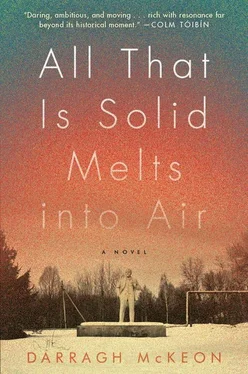If they travel at all. All this is what they have planned, but they’re supposed to leave in forty-five minutes and Yevgeni isn’t home yet.
Yevgeni left Mr. Leibniz’s two and a half hours ago. He was due to be home ninety minutes ago at the latest. They push their cabbage around and listen for the key slotting into the lock and a mass of apologies. Their gazes drift toward the window, but it’s already too dark to see much. A son and nephew, wandering out there somewhere.
Other plans have been put in motion, plans that only Maria and a few select people are aware of.
Pavel had been right about his friend Danil. The man knows how to put things together. Her meetings with him took place in nondescript offices. The two of them alone. There are others in the planning group but Danil meets them individually, so their plans aren’t compromised. Each time, he arrived and talked through her instructions and listened to any insights or worries she may have had and addressed them then or, if not immediately, certainly at their next meeting. Maria was worried about food and water supplies; Danil has arranged that there are enough canned goods and bottled water in the stockrooms to last the entire factory a month. When she asked what would happen when they cut off the heating, Danil told her that they’d managed to smuggle in two generators for electricity and enough gas canisters and heaters to see them through the first few weeks. If things become entrenched, they can ration the hours they use the heaters, and all the protective clothing in the factory will provide decent warmth.
When Yakov Sidorenko is playing, Zinaida Volkova will take to the stage and announce the strike, reading out a list of their demands. They have men assigned to block the door and take care of Sidorenko, the ministerial consort, and the factory management. Any workers will be free to leave, but it will be made clear to them that they can’t return. At that point they’ll take Alina and Yevgeni from the building.
The two sisters have called Yevgeni’s school friends and knocked on the doors of some boys in the building that he knows. Nothing. Nobody knows where he could be. Mr. Leibniz says he wasn’t worried or distressed, that when he left he seemed ready, normal, cocky. This worries them both even more.
Maria asks herself if he could have been picked up. Does anyone else know about this? No. Danil is too good at what he does. She did as he said and asked around. His reputation didn’t fit that of a KGB mole; he has had too much success in agitation, and he doesn’t display the particular brand of dumb curiosity that they project, always asking questions, always interested in what’s going on. Danil knows not to inquire about things that don’t concern him. And he is trusted by the right people. For Maria’s first meeting, Danil arrived with Zinaida Volkova, and Maria knew that, from then on, she would be prepared to do whatever was necessary. Zinaida is a unifying figure who the entire factory will get behind, her credibility is beyond doubt. The workforce knows she’s not there to line her own pockets. And she’ll be effective. She’ll make a formidable leader and a strong adversary in negotiations. Danil left them alone, and Maria spent a couple of hours talking to her, impressed by the clarity of thought the old woman displayed, the directness of her language, the simplicity of her goals. She was looking for an independent trade union, voted for by the workforce in open elections. They would be free to hold open meetings and free to strike. “Everything will come from this,” Zinaida said, and Maria doesn’t doubt that these two demands are enough to open up a whole range of possibilities. She does doubt that they can gain these kinds of concessions: what they are asking for is a shift in ideology, an opening of previously closed doors. For all the talk of restructuring and openness, they’ll soon find out how far the programmes of glasnost and perestroika will stretch.
And still he’s not home.
She should call Danil. He’s left a number to contact him on if anything unexpected comes up.
The ticking of the clock above the kitchen door resounds off all surfaces. A few ants walk determinedly along the floor, moving parallel to the kickboards at the bottom of their kitchen cabinets, then slipping away in a crevice at the corner. The cabinets are fronted with orange plastic. It gives the kitchen an oppressive air, makes the room feel even smaller. They’ve talked about this, talked through every aspect of this apartment, Alina always longing for better, Maria just wishing that every day would come to a close. Alina stands and starts opening the cupboards purposefully, and Maria doesn’t ask what she’s looking for, just watches her. She finds a long white plastic cylinder with a picture of a black ant on the front. She kneels down and pours a smooth, white line of the stuff into the seam between the floor and the kickboard.
Alina puts the cylinder back, sits down at the table again, and puffs out her cheeks.
“I’m past being annoyed. I’m worried now. Is he staying away or is he in trouble? Would he put his mother through this if he didn’t have to? That’s the question I’m asking myself.”
“I know.”
“It could be one or the other.”
“I know.”
Maria stands, goes into the hallway to grab her coat and hat, scarf and gloves.
She comes back in, wrapped up.
“I’m going to look for him.”
“I’ll stay here and wait.”
“I’ll be back in half an hour. If he comes home, get ready. I’ll change in five minutes.”
“Okay.”
The door closes. Alina stands and clears their plates, scraping food into the bin. She washes them, puts them on the draining board, and sits. This is an essential part of motherhood, the ability to sit and wait. Her life tied inextricably to that of her child.
She sits and waits. Then she stands and grabs a dishcloth and dries the two dishes.
YEVGENI REACHES the barber’s house, and the light is off, which is to be expected. He knocks on the door, a patterned knock with a 6/8 tempo that Iakov has taught him. There’s no answer, but Yevgeni perseveres and after a few minutes he can hear a shuffling and a little man with a sunken face opens the door and raises his eyebrows at the kid, asking Yevgeni what he wants without even having to speak.
The man’s name is Anatoly Ivanovich Nikolaenko—a permanent fixture of the district—who knows everything there ever was and anyone who ever could have been. Yevgeni always sees him on the street, walking that little mutt of his, which looks like half its parentage comes from rats. Yevgeni thinks the man might actually be three hundred years old, his face lined like bark.
“I have a message for Iakov.”
Anatoly whistles inside and calls Iakov’s name. He does this with a turn of the head and a slight arch backwards but otherwise doesn’t move, remains standing there with arms folded, both of them waiting, Yevgeni wanting to break the silence, Anatoly looking as if he had been born in this position.
Iakov emerges from the corridor, and Anatoly departs into the gloom.
“Come in,” Iakov says. He closes the door.
Yevgeni takes an envelope out of his jacket and hands it to Iakov.
“You’re a good one, Zhenya. You’re gonna grow up smart.”
Iakov puts an arm around Yevgeni, a fraternal act, but Yevgeni doesn’t like this, it feels unnatural, a gesture that he considers to be outside of his upbringing. Besides, Iakov’s not old enough himself to patronize him so much.
Yevgeni has been running packages for Iakov since their meeting in the junkyards. Some gambling thing he has going, Yevgeni knows better than to ask what. The job is totally uncomplicated. He knocks on a door, says Iakov sent him, and whoever is inside hands him a brown envelope, which he then delivers to Iakov. He never looks in the envelopes, but he knows there isn’t so much money in them: Iakov is too young to be allowed to run any kind of substantial operation. There are older men in the yards who would have control over these kinds of activities. Yevgeni knows all this; he knew it before he’d even been there. It’s the kind of common knowledge that floats about, one of those topics that cause adults to change their tone. Still, Iakov is good to Yevgeni, rewards him well, tells him to look after his mother.
Читать дальше












